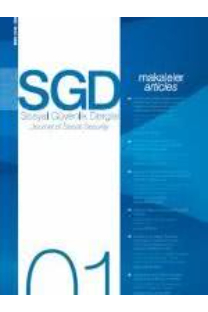İş Güvencesizliği Algısı ve İş Arama Davranışı İlişkisi: İstanbul ve Kocaeli Örneği
The Relationship of Perceived Job Insecurity with Job Search Behavior: Example of Istanbul and Kocaeli
___
- Ashford, S., Lee, C. ve Bobko, P. (1989). Content, Causes, and Consequences of job insecurity. A Theory-Based Measure and Substantive Test. Academy of Management Journal. 32 (4). 803- 829.
- Astarlıoğlu, A., Kazozcu S. B., Varnalia, R. (2011). A Qualitative Study of Coping Strategies in the Context of Job Insecurity. Procedia Social and Behavioral Sciences. Cilt 24. 421-434.
- Atan, M., Cam, E., Altay, F. Ç., Gürler, B., Çelik, E. ve Aslan, B. Y. (2017). İşsizlik Sigortası Ödemelerinin Yararlanıcıların İş Arama Eğilimlerine Etkisi. Yayın No: 59. Uzerler Matbaacılık. Ankara.
- Blau, G. (1994). Testing a Two-Dimensional Measure of Job Search Behavior. Organizational Behavior and Human Decision Processes Volume: 59 (2). 288 - 312.
- Borg, I., ve Elizur, D. (1992). Job insecurity: Correlates, Moderators and Measurements. International Journal of Manpower. Cilt 13. 13- 26.
- Bretz D., Boudreau J.W., Judge T. A. (1993). Job Search Behavior of Employed Managers. CAHRS Working Paper Series, Center for Advanced Human Resource Studies. 1-45.
- Çakır, Ö. (2007). İşini Kaybetme Kaygısı: İş Güvencesizliği. Çalışma Toplum Dergisi. 1 (12). 117-140.
- De Witte, H. ve Naswall K. Objective’ vs `Subjective’ Job Insecurity: Consequences of Temporary Work for Job Satisfaction and Organizational Commitment in Four European Countries. Economic and Industrial Democracy. 24 (2).149-188.
- Dursun, S. ve Bayram, N. (2013). İş Güvencesizliği Algısının Çalışanların Kaygı Düzeyleri Üzerine Etkisi: Bir Uygulama. Endüstri İlişkileri ve İnsan Kaynakları Dergisi. 15 (3). 20-27.
- Gökkaya, Ö., Latif, H. ve Uçkun, G. (2015). İş Arama Sürecinde İş İlanı Çözümlemesi ve İş Arayan - İş İlanı Uyumu. Kastamonu Üniversitesi İİBF Dergisi. Temmuz 2015. Sayı 8. 25 - 38.
- Greenhalgh, L. ve Rosenblatt Z. (1984). Job Insecurity: Toward Conceptual Clarity. Academy of Management Review. 9(3). 438-448.
- Güler, Kümbül B. (2012). İş Arama Davranışı: Bütüncül Psiko Sosyal Bir Yaklaşım. İş Güç Endüstri İlişkileri ve İnsan Kaynakları Dergisi. 14 (2). 7-24.
- Hellgren, J. Sverke ve M. Isaksson, K. (1999). A Two-dimensional Approach to Job Insecurity: Consequences for Employee Attitudes and Well-being. European Journal of Work & Organizational Psychology. 8 (2). 179-195.
- Huang, G. H, Nıu, X. Lee, C. ve Ashfor, S. (2012). Differentiating Cognitive and Affective Job insecurity: Antecedents and Outcomes. Journal of Organizational Behavior. Cilt 33. 752- 769.
- Kinnunen, U., Mauno, S., Natti, J. ve Happonen, M. (1999). Perceived Job Insecurity: A Longitudinal Study Among Finnish Employees. European Journal of Work and Organizational Psychology. 8 (2). 243 -260.
- Näswall, K. ve De Witte, H. (2003). Who feels insecure in Europe? Predicting Job Insecurity from Background Variables. Economic and Industrial Democracy. 24 (2). 189-215.
- Niesen, W. Anahí Van Hootegem, A. V., Handaja Y., Battistelli A. ve De Witte H. (2018). Quantitative and Qualitative Job Insecurity and Idea Generation: The Mediating Role of Psychological Contract Breach. Scandinavian Journal of Work and Organizational Psychology, 3 (3). 1-14.
- Rogelberg, Steven. G. (Ed.) (2007). Job Search. (içinde) Steven.G. Rogelberg The Encyclopedia of Industrial and Organizational Psychology. California: Sage Publications. Volume: 1. Thousand Oaks s 414-416.
- Rosenblatt, Z., Talmud, I. ve Ruvio, A. (1999). A Gender-based Framework of the Experience of Job Insecurity and Its Effects on Work Attitudes. European Journal of Work and Organizational Psychology. 8 (2). 197 - 217.
- Özmen, A. (2017). Kamuda Güvencesizlik Uyum ve Direniş. İstanbul: Notabene.
- Richter, A. (2011). Job Insecurity and Its Consequences Investigating Moderators. Mediators and Gender. İsveç: Stockholm University.
- Sverke, M., Hellgren, J. (2002). The Nature of Job Insecurity: Understanding Employment Uncertainty on the Brink of a New Millennium. Applied Psychology: An International Review. 57 (1). 23-42.
- Sverko Branimir, Galic., Zvonimir S., Darja, M. ve Galesic M. (2008). Unemployed People in Search of a Job: Reconsidering the Role of Search Behavior. Journal of Vocational Behavior. Cilt 72. 415-428.
- Slebarska,K., Moser, K. ve Luca G.G. (2009). Unemployment, Social Support, Individual Resources, and Job Search Behavior. Journal of Employment Counseling. Cilt 46. 159-170.
- ISSN: 2146-4839
- Yayın Aralığı: 2
- Başlangıç: 2011
- Yayıncı: SOSYAL GÜVENLİK KURUMU
Türkiye’de Engellilere Yönelik İstihdam Politikaları: Sorunlar ve Öneriler
Toplu İş Sözleşmelerine Etki Eden Faktörler: 1969-2014 Arası Sektörel Bir Analiz
Türkiye’de Kadınların İşgücü Piyasasına Yönelik Tercihleri: Kayıt Dışı Sektör Özelinde Bir Analiz
SELCEN ÖZTÜRK, DİLEK BAŞAR DİKMEN
İş Güvencesizliği Algısı ve İş Arama Davranışı İlişkisi: İstanbul ve Kocaeli Örneği
Türk Sosyal Güvenlik Sistemi İçerisinde Yaşlılara Yönelik Sosyal Yardım ve Sosyal Hizmetler
Ekonomik ve Sosyal Göstergelerin Kadınların Yaşam Beklentisi Üzerindeki Etkilerinin İncelenmesi
TÜRKER TOPALHAN, MEHTAP ÖZTÜRK, Sezin ÜNAL MİÇOOĞULLARI, Fatma YEŞİLKAYA
